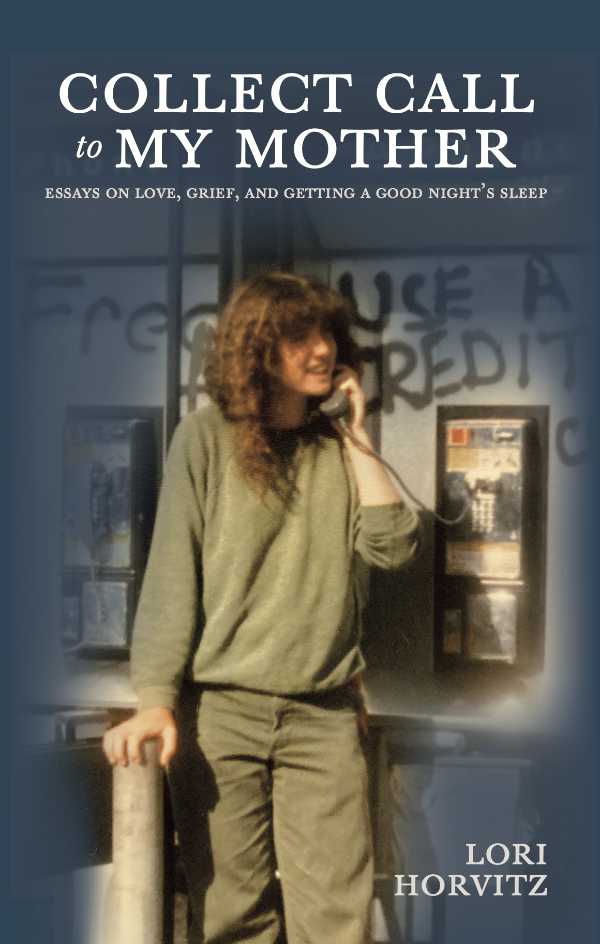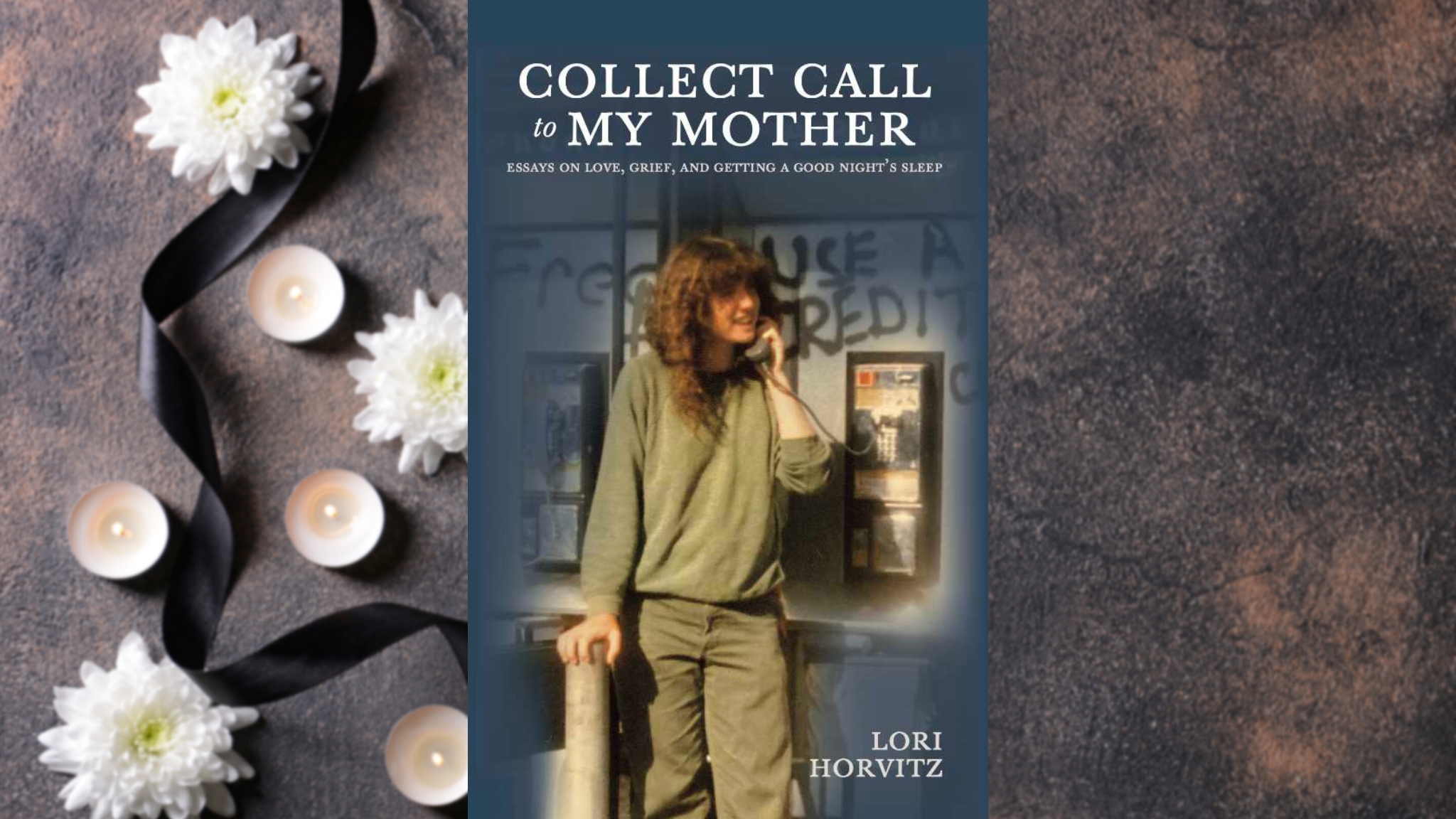Collect Call to My Mother: Essays on Love, Grief, and Getting a Good Night’s Sleep by Lori Horvitz
How do you find lasting love when you can’t even love yourself? How do you love yourself when you weren’t shown affection growing up? How do you process the loss of someone who was never emotionally there? How do you unravel the tangled strings of your past to form a better pattern for your future?
Lori Horvitz explores these questions in her latest memoir, Collect Call to My Mother: Essays on Love, Grief, and Getting a Good Night’s Sleep (New Meridian Arts). Through a series of essays, Horvitz reveals the strings that connect her tumultuous love life, her strained relationship with her mother, and her struggles with identity and grief.
Unattainable Love
Throughout this collection, readers witness a long history of disastrous relationships — some more humorous than tragic — including a moody anarchist, a rich gift-giver, three veterinarians, a few blonde drinkers and an overly jealous cult member. Some of Horvitz’ poor romantic decisions stem from her poor sense of identity and internalized homophobia; but even after Horvitz begins to embrace her sexuality, she continues to seek out unattainable partners.
The dynamic of yearning for unattainable love felt familiar, safe … If available, I had no interest, felt no spark, no passion. Or maybe fear kept me at arm’s length — fear of abandonment, of losing at love. Instead I gave myself no chance of winning; instead I opened my heart to highly combustible partners … inevitably, the union smoldered until a lone smoke plume hissed and fizzled.
Horvitz also connects her search for unattainable love with her upbringing, specifically her mother — a woman who was “only able to demonstrate love and affection to [her] black poodle.” Her conflicting feelings towards her mother were complicated further by her sudden death when Horvitz was 25 years old.
Grief & Ghosts
While the grief she feels for her mother takes center stage, Horvitz also tackles the loss of a close friend, a dog and an old mentor. Her grief takes its most memorable form in the lurking shadows of the paranormal — from dreaming of her mother’s car accident in real-time to the ghosts lingering in mirrors and the unbidden smell of nag champa. These paranormal energies intermingle with her grief and keep her up at night.
My theory on why I’m uncomfortable in antique shops is similar to why I have insomnia; maybe I have a thin skin when it comes to filtering out different energies, sounds and smells. Alternative healers might call this thin skin my aura.
This recurring theme of paranormal and grief-riddled insomnia gave the collection an interesting twist, especially in my favorite essay, “Sleep Cycles.”
Real Characters
In memoir, it’s easy to vilify one’s characters instead of showing them for what they are: flawed people. At the beginning of Collect Call to My Mother, readers are introduced to a cold woman who doesn’t care enough to spend the money to check in with her daughter as she travels alone across Europe.
But as the book goes on, layer by layer — in essays like “All the World’s Oceans,” “The Island of Tsk” and “The Microwave” — Horvitz slowly uncovers more of who her mother was. Yes, she was aloof towards her daughter. But she was also once an artist who studied abstract expressionism. She loved to travel — “wild, always clomping like a horse” — but never learned to drive. She was stifled by her generation and lost her independence the day she married.
“If she were alive today, she’d be a feisty ninety-year-old,” Horvitz says. “And now with unlimited minutes, she’d be in touch often.”
Thoughtful & Reflective
While each essay in this collection stands easily on its own, they flow together nicely to create a thought-provoking story. The connection between the first and final essays — “Collect Call to My Mother” and “Unlimited Minutes” — brings the book full circle and leaves the readers satisfied. By the end, Horvitz has embraced her identity, found a healthy relationship and gained a better understanding of her mother, which allowed her to better process her grief.
Horvitz tells her story with both heavy emotion and light humor, making for an enjoyable reading experience. Her observations about herself, her decisions, her family and her lovers shows a deep level of thought and reflection, giving the book a well-rounded perspective.
Collect Call to My Mother is a tender expression of conflicting grief and love. Readers will find themselves ensnared by the captivating prose and subtle wit. Some will find themselves relating to the story. Many will take away nuggets of wisdom. All will be moved.
 About Lori Horvitz:
About Lori Horvitz:
Author of the award-winning essay collection, The Girls of Usually, Lori Horvitz’ creative nonfiction has appeared in a variety of journals and anthologies including The Laurel Review, North Dakota Quarterly, The New York Times and The Guardian, to name a few. She has been awarded writing fellowships from a number of institutions and her essays have been included in two Seal Press anthologies: P.S.: What I Didn’t Say: Unsent Letters to Our Female Friends and Dear John, I’m in Love With Jane. Furthermore, she served as co-organizer of the Women’s March on Asheville in 2017 and 2019. Professor of English at UNC Asheville, Horvitz received a Ph.D. in English from SUNY Albany, and an MFA in Creative Writing from Brooklyn College.





